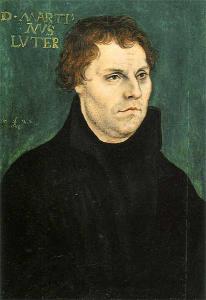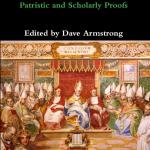
James Swan Misses the Forest for the Trees / Calvin & Melanchthon Embarrassed & Scandalized by Protestant Sectarianism
***
“Please Hit ‘Subscribe’”! If you have received benefit from this or any of my other 4,600+ articles, please follow this blog by signing up (with your email address) on the sidebar to the right (you may have to scroll down a bit), above where there is an icon bar, “Sign Me Up!”: to receive notice when I post a new blog article. This is the equivalent of subscribing to a YouTube channel. Please also consider following me on Twitter / X and purchasing one or more of my 55 books. All of this helps me get more exposure, and (however little!) more income for my full-time apologetics work. Thanks so much and happy reading!
Swan’s words will be in blue, Luther’s in green, Calvin’s in brown, and Melanchthon’s in purple.
***
Anti-Catholic Reformed Protestant James Swan wrote an article entitled, “The Evils of Private Interpretation: ‘There are almost as many sects and beliefs as there are heads’ “ (Boors All, 2-25-06). As usual, his goal is to show that Catholic apologists and other writers are incompetent, even dishonest stooges and buffoons: incapable of identifying the proper identification of a source. And accordingly, he says, “I’d like to demonstrate again the failure of Roman Catholic apologetics.”
My goal, however, is to go much deeper and analyze the import and significance of Luther’s statement. What are its implications? What does it suggest? Swan doesn’t touch any of that with a ten-foot pole. What’s quite obvious to one and all is that Luther despised and had contempt for this state of affairs. Swan wrote:
This is one of those quotes put forth by Roman Catholics attempting to substantiate Luther’s opinion of the failure of Protestant Biblical interpretation, as well as the need for the infallible authority of the Roman Catholic Church.
To this extent, I agree with Swan. As far as I know (having read quite a bit of Luther), he never denounced his own so-called “Reformation” or took any blame at all for bringing about a state of affairs in which “as many sects as heads” was even possible or thinkable, let alone actual. He didn’t blame private judgment or sola Scriptura, or the schismatic mentality, etc. Maybe something will turn up. But I think if it had, it would have been known by now and used in Catholic critiques of Luther and his ideas: which in the past were generally far more critical than they are now, and much more than my own point of view.
The strategy goes like this: use the above quote and then put forth something like- “…see, even Luther realized how much of a failure sola scriptura was.” . . .
they are misusing Luther to prove the alleged superiority of their church.
Well, in order to succeed in demonstrating that, it seems to me that the person would have to find Luther expressly making the specific point about sola Scriptura. I’ve never seen it. It’s perfectly legitimate and plausible, however, for Catholics to note that the change in the rule of faith — whatever Luther thought — indeed had a direct impact on the ludicrous proliferation of sects, which is directly contradictory to the biblical idea of one Church and no denominations. St. Paul was even more critical of sectarianism and division than Luther was.
“This one,” he says, “will not hear of Baptism, and that one denies the sacrament, another puts a world between this and the last day: some teach that Christ is not God, some say this, some say that: there are as many sects and creeds as there are heads. No yokel is so rude but when he has dreams and fancies, he thinks himself inspired by the Holy Ghost and must be a prophet.” (De Wette III, 61) [p. 214]
For a long time under the papal regime we have suffered many cruel seductions from the scoundrels or the wicked spirits, which we believed and held to be human souls who had died and were supposed to be walking around in the flesh. This belief has now been brought to light and revealed by the grace of God through the Gospel, so that we know that they are not human souls, but pure evil devils who have deceived the people with false answers and have established much idolatry throughout the world.*But now that the wretched devil sees that his blustering and thumping no longer counts, he attacks something new and begins to rage in his members, that is, in the godless, and thunders out all sorts of wild, dark beliefs and teachings. One does not want to be baptized, another denies the sacrament; another sees a world between this and the last day; some teach that Christ is not God; some say this, some that, and there are almost as many sects and beliefs as there are heads; his nonsense is now so gross that if he dreams or thinks of something, then the Holy Spirit must have inspired him and wants to be a prophet.*I must tell you an example here, because I have a lot to do with such ghosts. There is no one who claims to be more learned than Luther, who said, “They would all become nemesis of me; and if God would that they were what they think they are, and I were nothing.”
A fanatic from the Netherlands had come to Wittenberg, and had made his opinions known to Luther: this letter is directed against this and other fanaticisms. Luther wrote this letter in Latin, as Walch’s preface to the Xth Th. p. 90 claims, but Opsopoeus No. 15. gives it only in a Latin version (f. Beefenmeyer Litterargeſsch. d. Br. L. p. 58.) and so it can be found in Aurif. II. 281. Viteb. VII. 503. It was published in German under the title: A letter from D. Martini Luther to the Christians in Antorf. Wittenberg 1525. 4. S. Rotermund p. 43. It can also be found in German in the German edition Wittenb. II. 60. Jen. III. 109. Altenb. III. 101. Leipz. XIX. 345. Watch X. 1782. We deliver it in German after the first printing.
Is that enough primary documentation for Swan? If not, there is nowhere else to go. He commented under a related post on 11-28-07:
I would gladly welcome someone scrutinizing the text. In fact, I wouldn’t mind having some good translation work on this, even if it meant I was wrong on the conclusions I drew from the text. . . .
I can actually provide the German text for this quote, now that I actually have a reference (recall not one Catholic apologist I’ve ever come across has given any sort of helpful documentation for the quote…but they use the quote gleefully). . . .
I may be a bit paranoid due to all those in the RC’s in the past I’m used to dealing with.
His own article puts the lie to this (his claim in the second paragraph above). He himself cited the Catholic Encyclopedia (ironically and humorously without including the title of the article), which gave the title of the letter and the primary source from De Wette. That was in 1912. O’Hare also gave the primary source in 1916. Now we can access that in Google Books and translate it with Google Translate (which I did). It’ll all kosher and legit. Much ado about nothing, as usual.
One can readily see that O’Hare (or whoever else he may have gotten it from, in English) accurately translated it. The Catholic Encyclopedia article was written by Sydney Smith in 1912 under the title, “Union of Christendom.” Smith made, in my opinion, exactly the argument that should be set forth (one I have made myself, many times), without claiming that Luther agreed with it. He stated:
What was special and novel in Luther and his colleagues was that they erected the principle of an appeal to the Bible not only into an exclusive standard of sound doctrines, but even into one which the individual could always apply for himself without dependence on the authoritative interpretations of any Church whatever. Luther himself and his fellow-reformers did not even understand their new rule of faith in the Rationalistic sense that the individual inquirer can, by applying the recognized principles of exegesis, be sure of extracting from the Scripture text the intended meaning of its Divine author. Their idea was that the earnest Protestant who goes direct to the Bible for his beliefs is brought into immediate contact with the Holy Spirit, and can take the ideas that his reading conveys to him personally as the direct teaching of the Spirit to himself. But, however much the Reformers might thus formulate their principle, they could not in practice avoid resorting to the principles of exegesis, applied well or ill, according to each man’s capacity, for the discovery of the sense ascribed to the Holy Spirit. Thus their new doctrinal standard lapsed even in their own days, though they perceived it not, and still more in later days, into the more intelligible but less pietistic method of Rationalism.
Now, if the Bible were drawn up, as it is not, in the form of a clear, simple, systematic, and comprehensive statement of doctrine and rule of conduct, it might not, perhaps, seem antecedently impossible that God should have wished this to be the way by which his people should attain to the knowledge of the true religion. Still, even then the validity of the method would need to be tested by the character of the results, and only if these exhibited a profound and far-reaching agreement among those who followed it would it be safe to conclude that it was the method God had really sanctioned. This, however, was far from the experience of the Reformers. Luther had strangely assumed that those who followed him into revolt would use their right of private judgment only to affirm their entire agreement with his own opinions, for which he claimed the sanction of an inspiration received from God that equaled him with the Prophets of old [which he did indeed virtually claim, as I have documented to a tee]. But he was soon to learn that his followers attached as high a value to their own interpretations of the Bible as he did to his, and were quite prepared to act upon their own conclusions instead of upon his. The result was that as early as the beginning of 1525 — only eight years after he first propounded his heresies — we find him acknowledging, in his “Letter to the Christians of Antwerp” (de Wette, III, 61), that “there are as many sects and creeds in Germany as heads. . . .”
This is exactly my own opinion. Swan did, at least, cite a good chunk of the above, for which I give him credit. Luther’s big problem in this regard, per the “theory” above, was his extreme naivete: thinking that everything would be fine and dandy in his new system and never being able to conceptualize the quite arguable connection between it and the proliferation of sects.
It’s real simple in the final analysis: others applied Luther’s new rule of faith (sola Scriptura, private judgment, and a distorted individualistic supremacy of conscience) and went their own way, differing from Luther, just as he had with the Catholic Church. Any astute observer could have easily predicted what happened. Erasmus and More and Eck could see what was coming, in their disputes with Luther. But Luther couldn’t (or wouldn’t, one might opine).
For you see how the eyes of many are turned upon us, so that the wicked take occasion from our dissensions to speak evil, and the weak are only perplexed by our unintelligible disputations. Nor in truth, is it of little importance to prevent the suspicion of any difference having arisen between us from being handed down in any way to posterity; for it is worse than absurd that parties should be found disagreeing on the very principles, after we have been compelled to make our departure from the world. . . .*And surely it is indicative of a marvellous and monstrous insensibility, that we so readily set at nought that sacred unanimity, by which we ought to be bringing back into the world the angels of heaven. Meanwhile, Satan is busy scattering here and there the seeds of discord, and our folly is made to supply much material. At length he has discovered fans of his own, for fanning into a flame the fires of discord. (Selected Works of John Calvin: Tracts and Letters: Letters, Part 2, 1545-1553, vol. 5 of 7; edited by Jules Bonnet, translated by David Constable; Grand Rapids, Michigan: Baker Book House [Protestant publisher], 1983, 454 pages; reproduction of Letters of John Calvin, vol. 2 (Philadelphia: Presbyterian Board of Publication, 1858; the letter in question is numbered as CCCV [305] and is found on pp. 375-381; the portion above is from pp. 376-377).
the eyes of many are turned upon us, so that the wicked take occasion from our dissensions . . . our unintelligible disputations. . . . difference having arisen between us . . . after we have been compelled to make our departure from the world . . . we so readily set at nought that sacred unanimity . . . our folly . . .
The controversies among the Protestants in the sixteenth century roused all the religious and political passions and cast a gloom over the bright picture of the Reformation. Melanchthon declared [c. Dec. 1552?] that with tears as abundant as the waters of the river Elbe he could not express his grief over the distractions of Christendom and the “fury of theologians.” (History of the Christian Church, vol. 6, p. 46)
I do not, however, desire in this letter to do anything more than express my grief, which is so great, that it could not be exhausted, though I were to shed a flood of tears as large as our Elbe or your Thames.
You see what a multitude of explanations have been elaborated in former times, and are elaborated at this day; because a simple and sincere [appeal to] antiquity is neglected.
. . . no ambiguities should be left to posterity, as an apple of discord.
This most miserable anarchy causes me such anguish that I would gladly leave this life . . .*If only I could revive the jurisdiction of the bishops! For I see what sort of Church we shall have if the ecclesiastical constitution is destroyed.*I am unable to suggest anything that could heal this anarchy (letter to Hardenburg, c. 1558).*
*
***
*
Practical Matters: Perhaps some of my 4,600+ free online articles (the most comprehensive “one-stop” Catholic apologetics site) or fifty-five books have helped you (by God’s grace) to decide to become Catholic or to return to the Church, or better understand some doctrines and why we believe them.
Or you may believe my work is worthy to support for the purpose of apologetics and evangelism in general. If so, please seriously consider a much-needed financial contribution. I’m always in need of more funds: especially monthly support. “The laborer is worthy of his wages” (1 Tim 5:18, NKJV). 1 December 2021 was my 20th anniversary as a full-time Catholic apologist, and February 2022 marked the 25th anniversary of my blog.
PayPal donations are the easiest: just send to my email address: [email protected]. Here’s also a second page to get to PayPal. You’ll see the term “Catholic Used Book Service”, which is my old side-business. To learn about the different methods of contributing (including Zelle), see my page: About Catholic Apologist Dave Armstrong / Donation Information. Thanks a million from the bottom of my heart!
*
***
*
Photo credit: Martin Luther: 31 December 1525 (age 42), by Lucas Cranach the Elder [public domain / Wikimedia Commons]
Summary: Anti-Catholic Protestant polemicist James Swan falsely claimed that Catholics never documented this famous quotation, and as usual he ignored its troubling implications.













